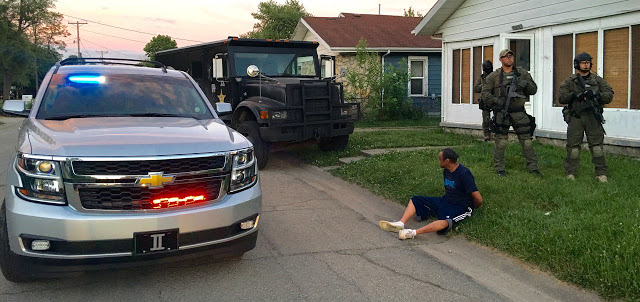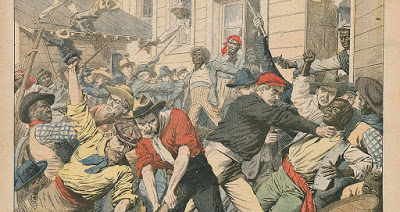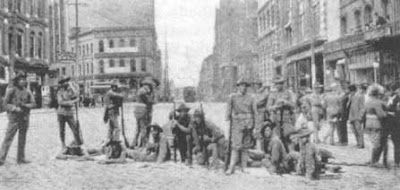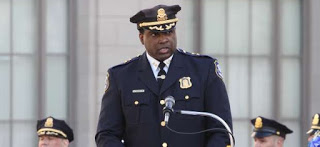Julius
Holmes was in his Macon, Georgia apartment cooking dinner when Officer
Rogers arrived to arrest him.
“I’ll be damned if you will,” Holmes hissed, making a
furtive move toward a handgun he had placed on a nearby bed.
Miraculously, Holmes wasn’t
gunned down by Officer Rogers, who simply shoved him aside and seized the
gun.
“I’ve come for you, and I am going to carry you even if it
takes the whole police force,” Rogers growled.
“It probably will,” Holmes defiantly replied. “Go ahead and
call them. I’ll die before I’ll be arrested.”
In many situations of this kind, a Mundane who made such a
declaration would be killed, and the incident would
be treated as a “suicide-by-cop.” Again, Rogers refrained from the use of
deadly force.
Not taking his eyes away from the non-compliant suspect, Rogers
turned to the woman who shared the house with Holmes – who had filed a
complaint against him after an argument the previous day – and directed her to
call for backup.
“Give me a summons,” Holmes told Rogers as the officer
waited for reinforcements. “I promise to show up in court tomorrow.”
Rogers grimly shook his head and moved to block the exit.
About twenty minutes later he was joined by Officer Jobson, and the two grabbed
Holmes by his arms to drag him from the house.
Somehow Holmes had procured a knife by the time the officers
went hands-on with him. Exercising preternatural self-restraint in dealing with
armed abductors, Holmes discarded the weapon, rather than using it. Instead, he
shrugged off the policemen and dashed back into the house – where he grabbed a
shotgun. Once again, he declined to use lethal force. Instead of opening fire,
Holmes took flight.
Summoned by the commotion in their neighborhood, a small
crowd had congealed outside of the home.
“Get him! Shoot him!” exclaimed a voice from inside the
thickening mob. Concerned that the officers might act on that exhortation,
Holmes pivoted in the direction of Officer Jobson, who unloaded four shots in
his direction. Two of the bullets fired by the officer wounded Holmes in the
extremities, and he was bleeding as he made a desperate dash toward the nearby
woods.
At this point, one member of the crowd, a Mr. Wimberly,
decided to deputize himself, peeling off from the group in pursuit of Holmes.
Jobson barked a warning about the shotgun – just as the weapon itself spoke.
Wimberly, who was about twenty-five feet behind Holmes, fell to the ground,
mortally wounded. If he hadn't failed the Tom Joad Test, Wimberly might have lived a long and rewarding life.
The gunshot wounds Holmes had suffered were not
life-threatening, but they slowed him down long enough for the Macon Police to
find and arrest him.
Charged with the murder of Mr. Wimberly, Holmes was convicted of voluntary manslaughter and sentenced to twenty years in the Georgia State Prison. That sentence was imposed in July.
Charged with the murder of Mr. Wimberly, Holmes was convicted of voluntary manslaughter and sentenced to twenty years in the Georgia State Prison. That sentence was imposed in July.
By November, the case was before the Georgia Court of Appeals -- which
overturned the conviction, ruling that Holmes acted lawfully in using lethal
force to prevent an unlawful arrest.
“This court fully understands and appreciates the delicate,
difficult, and sometimes dangerous duties which police officers are called upon
to perform, and it will uphold and protect them in the legal discharge of their
duties,” explained the opinion by appellate Judge
C.J. Hill. “But to approve the verdict in this case would
be in our opinion a violation of the sacred right of personal liberty, and a
disregard of the right to self-defense, which the law guarantees to every
citizen….”
During the trial, Holmes did not testify in his own defense,
nor did his attorney present a case of any kind. On the facts as presented by
the prosecution, Judge Hill declared, “the arrest or attempted arrest was
illegal. There was no warrant. The defendant was not `wanted for a state
offense, felony or misdemeanor.’ The offense for which he was wanted was a
trivial violation of a municipal ordinance. This trivial offense was not
committed in the presence of the arresting officers, but the day before a
complaint was filed by the [landlady] that the defendant had cursed her” – an
act that was described as “disturbing the peace.”
The officers had every opportunity to seek an arrest
warrant, if an arrest would have been justified. A bench warrant could have
been issued, as Holmes correctly pointed out.
“A policeman under these circumstances cannot be allowed to
dispense with a warrant when making or attempting an arrest any more than other
officers of the law,” continued the appellate court’s ruling. When the
policemen went into the defendant’s house to arrest him without a warrant, they were trespassers in a double sense –
trespassing upon the sacred right of personal liberty, and trespassers upon the
right of domicile. The defendant had a
legal right to resist both trespasses, and to use in resistance as much force
as necessary to make that resistance effective.” (Emphasis added.)
As armed intruders, the officers had no right to threaten
Holmes with violence, or to lay hands on him: “When the officers attempting to
make the illegal arrest of the defendant forcibly pulled him from his house and
endeavored to handcuff him, they were guilty of an assault and battery. The
defendant, thus wrongfully and illegally deprived of his liberty, had the right
to regain it, and to use all force necessary for that purpose.”
“The law values human life too highly to give an officer the
right to proceed to the extremity of shooting one whom he is attempting to
arrest for a violation of a municipal ordinance in order to prevent his escape,
even though the offender cannot be taken otherwise,” Judge Hill pointed out. Had
Holmes killed one of the officers, the court observed, that would have been an
act of justifiable homicide. If Jobson or Rogers had succeeded in fatally
shooting Holmes, “such killing would be felonious. Even with a warrant an
officer cannot legally kill one who flees from him to avoid arrest for a
misdemeanor.” On the same principle, the killing of the self-deputized Mr.
Wimberly was “entirely justifiable.”
“The principles of law which we have announced in the
foregoing opinion are not new,” summarized Judge Hill. “They come down to us from
the common law. They are well-settled both by the statutes and the decisions of
the Supreme Court of this state.” The guilty verdict was “wholly unsupported by
any evidence,” and incompatible with the law.
“Every person has the right to resist an illegal arrest,
whether attempted by an officer, or by a private individual, and, in
resistance, may use as much force as necessary for the purpose,” Hill
emphasized. This right inheres in every individual, “whatever his color or
condition.”
Thus it was that Julius Holmes, a black resident of heavily
segregated Georgia who had killed a white man while resisting the efforts of
two white police officers to arrest him, was set free on November 10, 1908.
To understand the tenor of the times in which that ruling
was handed down, it must be remembered that just two years earlier,
Georgia’s capital city had descended into a race riot in
which hundreds of homes and businesses were destroyed, middle-class black men
and women were dragged from trolley cars and beaten in the streets, and several
dozen of them were killed. The state militia was deployed to reinforce the
police, which did nothing whatsoever to protect the property of people living
in black neighborhoods.
Like citizens of every color and description in such
circumstances, black Atlanta
residents took up arms in their own defense.
The riot began on a Saturday night, and the violence abated
by Sunday morning. The following Monday, “the riot was revived when state
troops were informed that Negroes located in the outer city limits were holding
a meeting in which community leaders appealed to Negro citizens to defend
themselves,” recalled a 1984 Master’s
thesis by historian
Barbara A. Tagger. The state troops invaded Brownsville, a section of
Atlanta where Clark University and Gammon Theological Seminary were located,
and where many black residents had fled during the riot. Not surprisingly, they
weren’t willing to surrender their guns when the police, backed by the state
militia, demanded them.
After the police opened fire, black citizens shot back. One
officer was killed, three others wounded. At least four black citizens were killed
as well. Nearly three hundred black residents were arrested and charged with
conspiracy to murder police officers. Several of them were murdered in ambushes
as they were taken to jail. Meanwhile, the Atlanta police, several hundred
newly minted Fulton County Sheriff’s deputies, and roughly 3,000 troops fanned
out across Atlanta and the suburbs, conducting door-to-door gun confiscation.
“In the effort to restore order the military authorities
have begun to raid the negro settlements and disarm the negroes,” reported
a September 25 New York Times dispatch. “This policy was inaugurated this
morning and will continue until every negro in Atlanta and the suburbs is
disarmed.”
A few weeks later a Fulton
County Grand Jury was convened to investigate the riot and the criminal
charges arising from it. That body, composed of white citizens in a resolutely
segregated southern city, lambasted the Atlanta Police Department for
displaying “cowardice or active sympathy with the rioters,” describing its
actions as “a blot on the fair name and face of Atlanta.”
“When innocent persons were being maimed and murdered no
measure was too extreme for their protection,” intoned the panel. As the
Georgia State Court of Appeals would recognize two years later, that principle
applies to the use of righteous lethal force against police officers who
unlawfully threaten the physical liberty of individual citizens, irrespective
of “color or condition.”
More than a century later, Vernon Riddick, a black
police chief, in an address to a community gathering at a church in Waterbury,
Connecticut, would exhort his largely African-American audience to submit
with docility to whatever demand a police officer makes of them. If they are
detained without cause, or their homes invaded without a warrant, they should
comply with the officers and then “complain later to the department’s internal
affairs office” if they “feel” their rights have been violated.
Chief Riddick’s advice would have caused Julius Holmes to
knit his brows in disgusted incredulity – and probably have provoked the same
reaction from the arch-segregationist appellate judge who recognized that
Holmes had a right to kill a police officer who tried to arrest him without
cause.
This week's Freedom Zealot Podcast examines Hillary Clinton's attempt to frighten people into believing that Trump is Goldwater revisited -- and why we can only wish that this were so:
Dum spiro, pugno!






8 comments:
You left me hanging and chomping at the bit as to the outcome of troops illegally going door to door and disarming black citizens in this story
I'm on tenterhooks too, because I couldn't find out what happened, either. So it appears that a sequel is in order.
Check out the US Supreme Court case of John Bad Elk.
Donna - North Dakota
Do we have the 'right' to defend our soil and water resources from corporate interests using twisted 'trade' law to extort politicians and federalize law inforcement in order to take what they want?
What is happening here in the Dakotas, Iowa and Illinois is being implemented on an epic scale - threatening the entire water system of the Missouri and Mississippi River Basins as well as the rich farmland being taken through domain by a privately owned pipeline company intending to bring Bakken crude to offshore buyers.
No one outside this area is remotely aware of the ruthlessness of the corporate agenda being acted upon here.
https://m.facebook.com/nobakken/
https://m.facebook.com/CampoftheSacredStone/
Of course, I meant 'the taking of privately owned farmland through use of eminent domain' in addition to the inevitable pollution of land and water for the exclusive benefit of corporate profits.
Yesterday, July 26, The US Army Corps of Engineers approved the permit allowing horizontal drilling for the 30" pipeline beneath both the Missouri and Mississippi Rivers at a depth of 100 feet under the ever changing riverbeds of each.
The internal pressure of up to 550,000 DAILY barrels of crude oil flowing through the pipeline on its 1,134 mile trip to the Patoka, IL hub will be 1,140 PSI!
But I thought government is my loving mommy that exists only to serve me and build the glorious Tower of Babel 2.0 utopia?
Forward!
North Dakota
Standing Rock Nation sues
http://m.bismarcktribune.com/bakken/tribe-files-lawsuit-over-pipeline/article_38080995-0680-5e53-9ee5-19eab963b82a.html
Find link to document at
http://standingrock.org/news/in-the-united-states-district-court-for-the-district-of-columbia/
No doubt WTO provisions guaranteeing a corporation's 'right to profit for its investors' will magically make this go away.
This just in...Putin is the *evil* Hitler Satan and the Soviets are coming!
Only The Whore of Babylon aka Hillary can save us from this menace.
The diabolical Trumphitler is also working with the *evil* Hitler Satan Putin and he uses dog whistles and hand signals in his speeches to signal dastardly vile Russian hackers to hack Hillary's servers!
These untermenschen Russian hackers lurk around every router and server.
Ted Baxter
Post a Comment